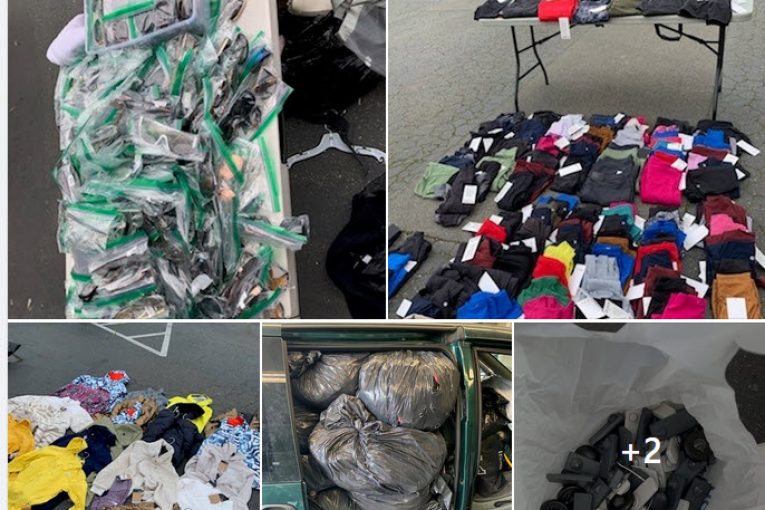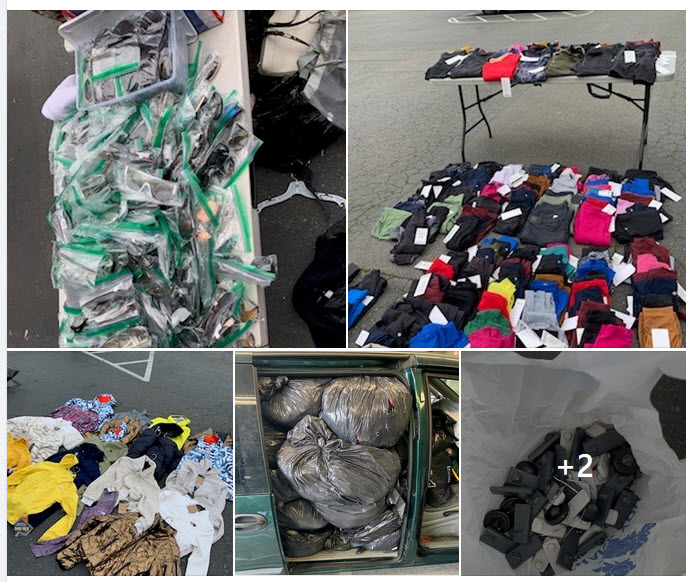

By David M. Greenwald
Executive Editor
Syndicated columnist Tom Elias jumps on the anti-Prop 47 bandwagon this week. He writes, “If any California proposition of the last half-century is an obvious candidate for a major rewrite, it is the 2014 Proposition 47, which made small-time offenses out of all thefts of more than $950 value unless the perpetrator had a prior history of violent crimes.
“For sure, it is currently under threat,” he continues. “Alive right now in the Legislature are several efforts to cancel most of Prop. 47 or increase penalties for some crimes it deems minor.”
But it will take voter approval to change Prop. 47 and efforts to do so in 2020 went down in flames with Prop. 20.
Moreover, unlike, say, the LA Times editorial board a few weeks ago, Elias really doesn’t do his  homework.
homework.
Tom Elias for the most part carries the water for police and tough-on-crime advocates, without really diving deep into the data. That’s a big problem.
For example, he argues, “Ask most police and they’ll say this law is a major factor behind the wave of shoplifting that has plagued cities like San Francisco, Los Angeles and Fresno and caused closure of many retail stores, especially in San Francisco.”
But is there data to support this? Moreover, most counties including San Francisco have charged the smash and grab and organized retail theft as felonies. They do so either because the amount exceeds the $950 threshold (in some cases by a lot) or because they are charging a felony conspiracy to commit a misdemeanor.
So, when he says, “For now, under Prop. 47, this can only be charged as a misdemeanor” and “very likely one motivating factor in the group smash-and-grabs involving as many as 80 persons per incident and about as organized as they could have been,” he ignores the fact that those people who were caught have all been charged with felonies.
That seems like a pretty big error not to acknowledge that those people were charged with felonies.
He continues: “It’s true that a variety of police and media studies have shown crimes like larceny are up about 9 percent since the new value limits – up from the prior $250 petty theft limit – were raised eight years ago.”
We will give him the benefit of the doubt and say that is a typo—Prop. 47 raised California’s limit from $450 (not $250) up to $950.
Did crime go up in California under Prop. 47? Not really. We have shown you data. What did happen is that a lot of things changed with the COVID pandemic. We also saw a nationwide surge in the murder rate—but as we have demonstrated that has occurred in red areas as well as blue, states with no criminal law changes and states with some major ones.
As the LA Times pointed out in a recent editorial, blaming this on specific policies is hard to justify when “murder is hardly an only-in-L.A. phenomenon. It has risen just as much in most U.S. states and cities regardless of whether they are led by old-school tough-on-crime leaders or reform-oriented officials.”
On the other hand, while retail theft has really drawn attention, the editorial board notes that “robbery and burglary in L.A. have declined since 2019, continuing a historic decease in crime rates, notwithstanding recent high-profile ‘smash and grab’ thefts at retail stores.”
Moreover, Elias and just about everyone on the tough-on-crime side seems to overlook the fact that California is not some outlier with a $950 felony limit. In fact, California is still on the tougher side of most states.
“Some of the most conservative, tough-on-crime states had higher dividing lines than California even before Proposition 47 passed. Texas was at $1,500. It has since raised the line to $2,500, matching South Carolina. Most states are now at $1,000 or more, so even at $950, California’s threshold is now among the toughest third of states,” they write.
This is a point worth emphasizing—the police complain that the $950 is inducing crime in California, but California has a lower limit than two-thirds of the states, even with the increase.
As they write, “No one’s rushing here because ‘purge’-like crime sprees are easier here than anywhere else.
“The reason for adjusting the line upward is inflation. If the price of goods rises but the threshold does not, the same thefts that were once misdemeanors become felonies and prisons become overcrowded even as property crime drops. That’s what happened in California beginning in the 1980s, when lawmakers stopped raising the threshold,” the Times pointed out. “But now we’re stuck again, this time at $950, as the cost of goods continues to rise.”
This is really the single point that undermines the whole idea that Prop. 47 is causing the rash of retail theft in California.
Instead, they argue: “The problem with Proposition 47 is not that the threshold is too high. It’s not. The problem is that there is no automatic inflation adjuster.”
Elias acknowledges this late in his column.
He writes, “Backers of Prop. 47, including Gov, Gavin Newsom, have long noted the felony theft floors in conservative places like Texas and South Carolina are more than double the current California amount. They say inflation prior to Prop. 47 meant onetime misdemeanors were now routinely being prosecuted as felonies, thus overloading prisons and county jails with minor criminals.”
He never really addresses the issue.
Instead he argues: “Still, it’s hard to overestimate the effects of the smash-and-grab events. Politically, without them, the toughen-47 proposals would go nowhere.”
Perhaps, but if the smash and grab events start fading from media attention—as they mainly have—it may be a more fleeting moment than you think.
But even then, is Prop. 47 really driving this? In a lot of cases, the amount taken far exceeds the Prop. 47 threshold.
For example, you have stories like the one that came out this week where $72,000 in stolen merchandise was taken from a Lululemon store in Studio City—obviously that’s a bit more than the felony threshold and Prop. 47 doesn’t impact that at all.
Moreover, in another instance, the CHP announced earlier this week that their “Organized Retail Crime Task Force carried out an operation in the Bay Area and recovered stolen merchandise estimated at $185K. The operation led to the arrest of a known fencing suspect, and the recovery of merchandise stolen from numerous retailers, including items stolen during the Louis Vuitton takeover robbery at Union Square in San Francisco.”
Hard to blame Prop. 47 for incidents where the amount taken far exceeds the felony limit.


I doubt it, not with the recent cargo train robberies occurring in L.A.
Governor Newsom:
https://www.atlantabusinessjournal.com/wp-content/uploads/2022/01/train-los-angeles.jpg
So much for defunding the police:
Thee are focusing on the criticism of Prop. 47. The issue is the general drift towards allowance of lesser crimes because the criminals have reasons for doing what they are doing. I am not for three strikes; I not for arresting people for drug possession or use. However, I am also not for removing enforcement or incarceration for what some are now calling minor crimes. Is that a ‘tough on crime’ stance? No, it’s kinda in betweenie. The focus on Prop. 47 isn’t the issue, it’s the general attitude of tolerance to crime that is the issue. That pendulum has swung, and toppled the justice reform movement in the pendulum’s harsh return stroke.
I hope it is not “allowance”, but as G&S wrote in the Mikado, “let the punishment fit the crime”… forgetting, for the moment, about rehab, intervention, etc., often the punishment does NOT fit the crime…
This is one place where the federal government actually has jurisdiction and should intercede on behalf of the nation. The feds are responsible for interstate commerce but seem to be absent. With a Secretary of Commerce like Pete Buttigieg who has not been successful at anything he has done; it is not a surprise that we have no control. The Railroad police should be authorizing the use of lethal force against these modern day Desperados.
Just another place where Biden administration has failed.
Your deprecation of Buttigieg, rather than the bigger picture (he’s only the Secretary of Commerce not DOJ) is ‘telling’…
In the aftermath of the SF quake and fire in 1906, the rule was all looters could be shot on sight. No problem.
Yes… that’s how I feel about the folk who stormed the Capitol Jan 6, 2021, to negate (steal) a valid election process,,,
The police should have used much more “lethal force” would have cut down on legal costs.
“funny” how Republicans question the election, as to president, but do not question the results where Republican candidates gained seats… same d*$n ballots… all cast at the same time.
5
One of them was . . . shot and killed that is . . .
and . . . railroad police can’t authorize, they have to *be* authorized.
Your calling Buttigieg the Secretary of Commerce is ‘telling’…
But Buttigieg did claim that he saved Christmas. LOL